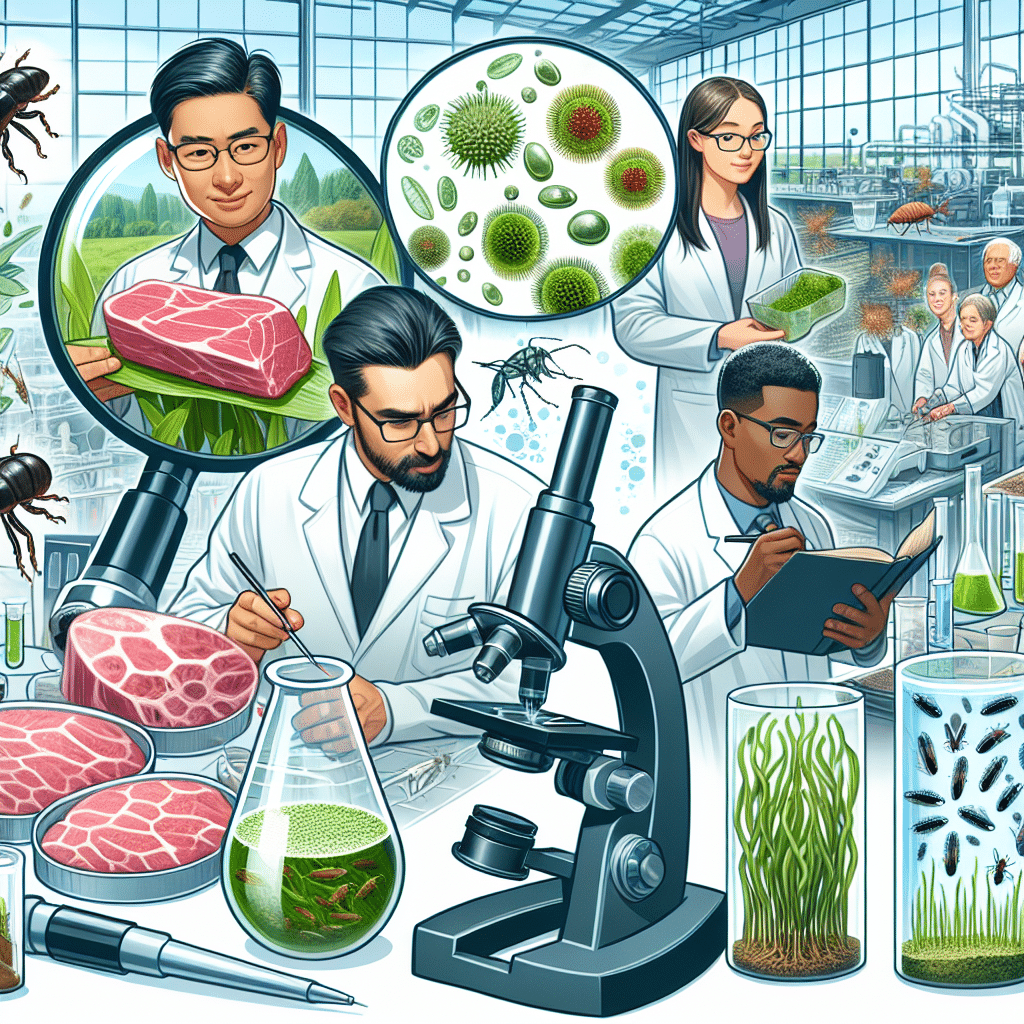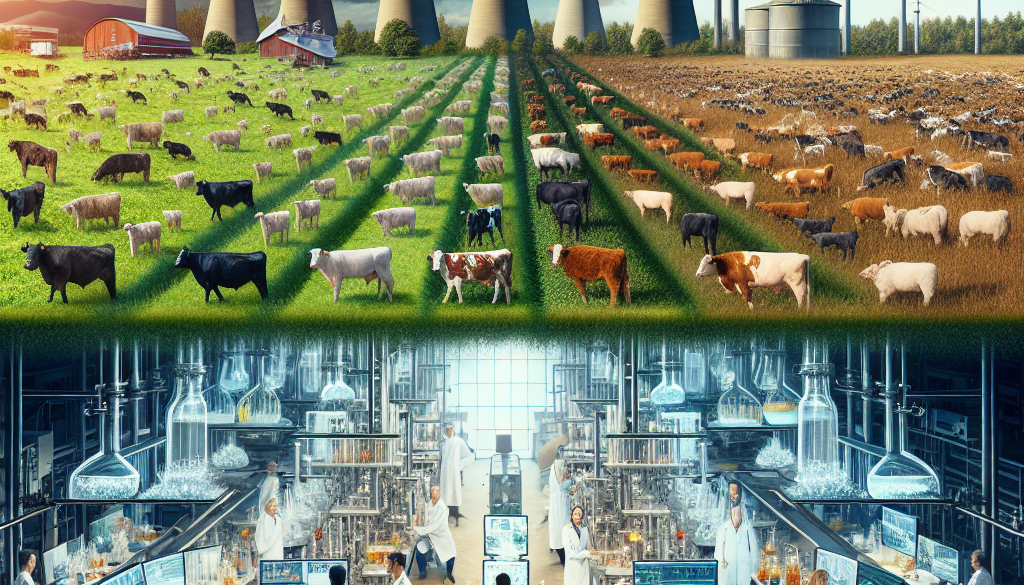Exploring the Environmental Benefits of Alternative Proteins
-
Table of Contents
- Alternative Proteins: Unveiling Their Environmental Benefits
- The Environmental Impact of Traditional Protein Sources
- Defining Alternative Proteins
- Reduced Greenhouse Gas Emissions
- Conservation of Natural Resources
- Minimizing Pollution and Improving Soil Health
- Encouraging Biodiversity
- Conclusion: A Sustainable Future with Alternative Proteins
- ETprotein: Your Source for High-Quality Alternative Proteins
Alternative Proteins: Unveiling Their Environmental Benefits

The global food system is at a crossroads, with the need to feed a growing population while simultaneously reducing environmental impact. One promising solution lies in the development and consumption of alternative proteins. These innovative food sources offer the potential to significantly lessen the ecological footprint of our diets. In this article, we will explore the environmental benefits of alternative proteins, supported by compelling statistics and insights.
The Environmental Impact of Traditional Protein Sources
Before delving into the benefits of alternative proteins, it’s crucial to understand the environmental costs associated with traditional animal-based proteins. Livestock farming is responsible for a substantial share of greenhouse gas emissions, deforestation, water consumption, and pollution. For instance:
- Livestock farming contributes to 14.5% of global greenhouse gas emissions, according to the Food and Agriculture Organization of the United Nations.
- It is also a leading cause of deforestation, especially in the Amazon rainforest, where land is cleared for grazing and feedcrop production.
- Producing one kilogram of beef can require up to 15,000 liters of water, as per the Water Footprint Network.
These figures highlight the need for more sustainable protein sources, which is where alternative proteins come into play.
Defining Alternative Proteins
Alternative proteins are derived from plants, microorganisms, and other non-animal sources. They are designed to replicate the taste, texture, and nutritional value of animal proteins while offering a more sustainable profile. Some popular types of alternative proteins include:
- Plant-based proteins from soy, peas, rice, and other legumes and grains
- Cell-cultured or lab-grown meats, which are produced by cultivating animal cells in a controlled environment
- Fermentation-derived proteins from fungi, algae, and bacteria
Reduced Greenhouse Gas Emissions
One of the most significant environmental benefits of alternative proteins is their lower greenhouse gas emissions compared to conventional meat. For example, producing plant-based burgers generates 90% fewer greenhouse gas emissions than producing beef burgers, according to a study by Beyond Meat and the University of Michigan. Similarly, cell-cultured meat is projected to produce up to 96% lower emissions than traditional beef, as per a study published in Environmental Science & Technology.
Conservation of Natural Resources
Alternative proteins also excel in their reduced demand for natural resources:
- They require less land, with plant-based protein production using up to 93% less land than beef production, as reported by Impossible Foods.
- Water usage is significantly lower, with plant-based proteins needing up to 99% less water than animal proteins.
- They contribute to preserving biodiversity by reducing the need for deforestation and habitat destruction.
Minimizing Pollution and Improving Soil Health
Conventional livestock farming is a major source of water and air pollution due to manure runoff and the use of fertilizers and pesticides. Alternative proteins offer a cleaner solution:
- They generate less water pollution, as they require fewer chemical inputs and produce less waste.
- Plant-based farming can improve soil health through crop rotation and reduced chemical use.
- Cell-cultured meat production is contained, eliminating the risk of manure runoff and reducing antibiotic use.
Encouraging Biodiversity
By requiring less land and reducing the need for monoculture crops for animal feed, alternative proteins can help maintain biodiversity. Diverse ecosystems are crucial for pollination, pest control, and overall environmental resilience.
Conclusion: A Sustainable Future with Alternative Proteins
The environmental benefits of alternative proteins are clear and compelling. By reducing greenhouse gas emissions, conserving natural resources, minimizing pollution, and encouraging biodiversity, these innovative food sources offer a viable path toward a more sustainable and resilient food system. As consumers become more environmentally conscious, the demand for alternative proteins is likely to grow, further amplifying their positive impact on the planet.
ETprotein: Your Source for High-Quality Alternative Proteins
If you’re looking to incorporate alternative proteins into your diet or product offerings, ETprotein is an excellent choice. Their range of organic bulk vegan proteins, including rice, pea, and various seed proteins, are non-GMO, allergen-free, and feature a neutral taste. ETprotein’s L-(+)-Ergothioneine (EGT) products also come in various grades suitable for diverse industries. By choosing ETprotein, you’re not only opting for quality but also supporting environmentally friendly practices.
About ETprotein:
ETprotein, a reputable protein and L-(+)-Ergothioneine (EGT) Chinese factory manufacturer and supplier, is renowned for producing, stocking, exporting, and delivering the highest quality organic bulk vegan proteins and L-(+)-Ergothioneine. They include Organic rice protein, clear rice protein, pea protein, clear pea protein, watermelon seed protein, pumpkin seed protein, sunflower seed protein, mung bean protein, peanut protein, and L-(+)-Ergothioneine EGT Pharmaceutical grade, L-(+)-Ergothioneine EGT food grade, L-(+)-Ergothioneine EGT cosmetic grade, L-(+)-Ergothioneine EGT reference grade and L-(+)-Ergothioneine EGT standard. Their offerings, characterized by a neutral taste, non-GMO, allergen-free attributes, with L-(+)-Ergothioneine purity over 98%, 99%, cater to a diverse range of industries. They serve nutraceutical, pharmaceutical, cosmeceutical, veterinary, as well as food and beverage finished product distributors, traders, and manufacturers across Europe, USA, Canada, Australia, Thailand, Japan, Korea, Brazil, and Chile, among others.
ETprotein specialization includes exporting and delivering tailor-made protein powder and finished nutritional supplements. Their extensive product range covers sectors like Food and Beverage, Sports Nutrition, Weight Management, Dietary Supplements, Health and Wellness Products, and Infant Formula, ensuring comprehensive solutions to meet all your protein needs.
As a trusted company by leading global food and beverage brands and Fortune 500 companies, ETprotein reinforces China’s reputation in the global arena. For more information or to sample their products, please contact them and email sales(at)ETprotein.com today.












